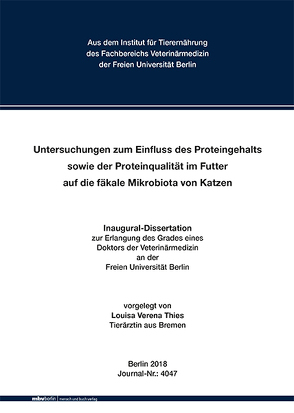
Investigations on the impact of dietary protein concentration and quality on the fecal microbiota in cats
The objective of this study was to investigate the impact of dietary protein concentration and quality on the composition and metabolic activity of the intestinal microbiota in cats. The hypothesis of the study was that dietary protein concentration and quality can affect microbial traits.
In a feeding trial, six different diets varying in protein quantity and quality (lower or higher amount of connective tissue) were offered to ten clinically healthy adults cats. A randomized latin square cross over design allowed simultaneous use of all six diets. Cats received each diet over a period of six weeks. Fecal samples examined in this study were collected on day 41 or 42 of each feeding period and were stored at -80 °C until further analysed.
Sequencing the V3-V4-region of the 16S rRNA-gene by Illumina® showed that the relative abundance of the genus Clostridium in feline fecal samples was over 20 % and of the genus Blautia approximately 17 %, regardless of the used diet. In addition, the prevalence of the genera Prevotella, Collinsella, Fusobacterium and Eubacterium reached between 4 and 5 %. However, the majority of all detected genera in cat feces showed proportions below 1 %. Dietary associated changes in the composition of feline fecal microbiota were determined for the relative abundance of Fusobacterium, Bacteroides, Prevotella and Faecalibacterium. In particular, increasing protein concentrations led to a higher relative abundance of Fusobacterium and Bacteroides, whereas the relative abundance of Prevotella and Faecalibacterium decreased. Moreover, low protein quality of the diets resulted in an increase of the relative abundance of Fusobacterium in feline feces.
Investigations of fecal samples by use of qPCR showed an increase of C. coccoides-Cluster XIVa in fecal samples when cats received a diet with low protein quality.
Taken together, molecular methods revealed an increase of predominantly peptidolytic bacteria, especially Fusobacterium and Bacteorides in feces of cats with a higher protein intake, whereas the impact of protein quality was not as distinct.
Apart from the investigation of the microbial composition of feline fecal microbiota with molecular biological analyses, further chemical analyis were used in this study to assess the effect of dietary protein content and protein quality on the metabolic activity of the intestinal microbiota in cats. Dietary protein quality showed no effect on investigated bacterial metabolites, such as ammonia, biogenic amines, D-/L-lactate and short chain fatty acids in feline fecal samples. In contrast, high dietary protein levels led to an increase of fecal ammonia and i-valeric acid concentrations and to a decrease of fecal histamine and cadaverine concentrations.
Based on the results, it can be presumed that high dietary protein levels caused an increase of peptidolytic activity of the intestinal microbiota. However, the cause of the observed decreasing concentrations of biogenic amines in the feces of the cats fed a diet high in dietary protein has not been fully clarified. Therefore, further studies are required to investigate this aspect more thoroughly.
In conclusion, the results of the present study lead to the assumption that the composition and metabolic activity of the intestinal microbiota in cats is more distinctly influenced by dietary protein concentration than protein quality. The present study contributes to an improved understanding of the effects of dietary protein on the intestinal microbiota in cats. The results can help to develop further studies and dietetic strategies to support specifically gastrointestinal health in both healthy and diseased cats.
Aktualisiert: 2019-12-31
> findR *
MEHR ANZEIGEN
Bücher zum Thema prevotella
Sie suchen ein Buch über prevotella? Bei Buch findr finden Sie eine große Auswahl Bücher zum
Thema prevotella. Entdecken Sie neue Bücher oder Klassiker für Sie selbst oder zum Verschenken. Buch findr
hat zahlreiche Bücher zum Thema prevotella im Sortiment. Nehmen Sie sich Zeit zum Stöbern und finden Sie das
passende Buch für Ihr Lesevergnügen. Stöbern Sie durch unser Angebot und finden Sie aus unserer großen Auswahl das
Buch, das Ihnen zusagt. Bei Buch findr finden Sie Romane, Ratgeber, wissenschaftliche und populärwissenschaftliche
Bücher uvm. Bestellen Sie Ihr Buch zum Thema prevotella einfach online und lassen Sie es sich bequem nach
Hause schicken. Wir wünschen Ihnen schöne und entspannte Lesemomente mit Ihrem Buch.
prevotella - Große Auswahl Bücher bei Buch findr
Bei uns finden Sie Bücher beliebter Autoren, Neuerscheinungen, Bestseller genauso wie alte Schätze. Bücher zum
Thema prevotella, die Ihre Fantasie anregen und Bücher, die Sie weiterbilden und Ihnen wissenschaftliche
Fakten vermitteln. Ganz nach Ihrem Geschmack ist das passende Buch für Sie dabei. Finden Sie eine große Auswahl
Bücher verschiedenster Genres, Verlage, Autoren bei Buchfindr:
Sie haben viele Möglichkeiten bei Buch findr die passenden Bücher für Ihr Lesevergnügen zu entdecken. Nutzen Sie
unsere Suchfunktionen, um zu stöbern und für Sie interessante Bücher in den unterschiedlichen Genres und Kategorien
zu finden. Unter prevotella und weitere Themen und Kategorien finden Sie schnell und einfach eine Auflistung
thematisch passender Bücher. Probieren Sie es aus, legen Sie jetzt los! Ihrem Lesevergnügen steht nichts im Wege.
Nutzen Sie die Vorteile Ihre Bücher online zu kaufen und bekommen Sie die bestellten Bücher schnell und bequem
zugestellt. Nehmen Sie sich die Zeit, online die Bücher Ihrer Wahl anzulesen, Buchempfehlungen und Rezensionen zu
studieren, Informationen zu Autoren zu lesen. Viel Spaß beim Lesen wünscht Ihnen das Team von Buchfindr.
